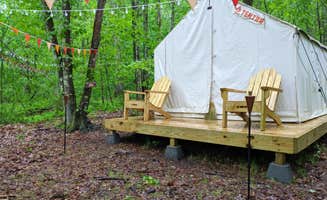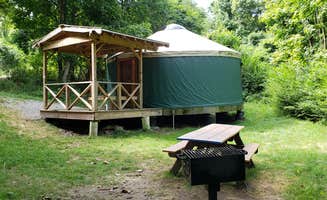Primitive tent campsites near Pascoag, Rhode Island are concentrated within public lands and small family campgrounds throughout the region's mixed hardwood forests. The area sits at elevations between 400-600 feet above sea level, with distinct seasonal temperature variations that make spring and fall particularly popular for woodland camping. Most campsites lack cell phone reception, requiring advance planning for navigation to these remote locations.
What to do
Water activities at Buck Hill: Buck Hill Campground features a pond suitable for non-motorized boating and swimming without lifeguard supervision. A camper notes, "The area is heavily wooded without much else around and very few amenities... This is the type of campground to just come and unwind, fish, cook, etc don't expect much else."
Hiking at Arcadia Management Area: The extensive trail system accommodates hikers, mountain bikers, and horseback riders. Some trails connect directly to backcountry camping areas, allowing for true wilderness immersion with minimal facilities.
Winter exploration: Unlike many Rhode Island campgrounds that close after fall, several management areas permit winter backcountry camping with proper permits. Winter campers should bring insulated sleeping pads as ground temperatures frequently drop below freezing from December through March.
What campers like
Secluded waterfront sites: At Buck Hill Campground, groups appreciate the privacy of large clustered sites that can accommodate multiple tents. A visitor mentioned, "All the sites are in large clusters (each can accommodate 10+ tents). Many of the sites are also along Wakefield Pond (big enough lake for canoe/kayak/etc."
Rustic environment: The primitive nature of camping near Pascoag appeals to those seeking authentic outdoor experiences. The minimal development and facilities create opportunities for genuine wilderness immersion within 90 minutes of Providence.
Wildlife encounters: The northwest corner of Rhode Island provides opportunities to observe white-tailed deer, wild turkey, and various woodland birds. Early morning and dusk offer the best wildlife viewing times near campsites.
What you should know
Limited facilities: Most tent-only sites have minimal amenities. At Ginny B Camp Grounds, campers have access to basic facilities including drinking water, showers, and trash disposal, but sites remain relatively primitive with natural terrain.
Reservation challenges: Many public lands camping areas operate on first-come, first-served basis with no formal reservation systems. During peak summer and fall foliage weekends, arriving by Thursday or early Friday provides the best chance of securing preferred sites.
Weather considerations: Northwestern Rhode Island experiences temperature fluctuations more extreme than coastal areas. Summer temperatures can range from 50-90°F within a 24-hour period, requiring appropriate clothing layers even in summer months.
Tips for camping with families
Site selection strategy: Choose larger group sites for family camping. At LeGrand Reynolds Camping Area, the open layout allows parents to monitor children while providing space for play areas separate from cooking and sleeping spaces.
Water safety planning: Bring personal flotation devices for children when camping near ponds and lakes. Most water access points lack designated swimming areas or safety equipment, requiring direct parental supervision.
Activity preparation: Pack field guides and wildlife identification cards to engage children in nature observation. The diverse forest ecosystem supports educational opportunities regarding local flora and fauna.
Tips from RVers
Access limitations: Most tent camping areas near Pascoag have restricted vehicle access on narrow, sometimes unpaved roads. At Frosty Hollow Camping Area, larger vehicles may have difficulty navigating the entrance roads, particularly after heavy rainfall.
Alternate options: For RV camping with amenities, consider Water's Edge Campground in nearby Coventry (approximately 25 minutes from Pascoag). This location offers electric hookups, water connections, and proper sanitary dump stations suitable for recreational vehicles.
Seasonal accessibility: Access roads to primitive camping areas often become impassable for larger vehicles during winter months and spring thaw periods. Most management areas restrict vehicle traffic on unpaved roads from November through April to prevent erosion and road damage.



